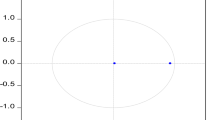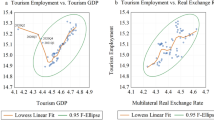Abstract
This article examines the impact of detailed tourism expenditure on the long-run economic growth by employing autoregressive distributed lag approach and Hatemi causality test to investigate causality for 2005:I to 2012:1 in Turkey. New data set tourism detailed expenditure—is employed that has not previously been used for the causality of tourism expenditure on economic growth. The results of the bounds test show that there is a sustainable long-run relationship between each of the tourism expenditure and economic growth. The results of the causality test, on the other hand, show that there is bidirectional causality between university graduate tourists’ expenditure and economic growth and a causal flow from high school tourism expenditure to GDP growth which is verified growth-led tourism hypothesis. Results reveal that university and post graduate degree with tourists’ expenditure is more successful on explaining the long-run relationship between tourism expenditure and economic growth in Turkey. This result implies a policy that, although Turkey need to focus more on tourism development for all level of education to reach higher real income levels; policy makers should concentrate on attracting the attention of university graduate tourist to gain more from tourism industry.
Similar content being viewed by others
Notes
Asymmetric causal effects stemming from asymmetric information phenomenon and absence of no separation between the causal impacts of positive or negative shocks are some of the most important factors that determine causality among variables. Since Toda-Yamamoto procedure does not take this asymmetric structure into account, this paper uses causality test developed by Hatemi (2012) which is good at dealing with this problem.
References
Arslanturk, Y., Balcilar, M., Ozdemir, Z.A.: Time-varying linkages between tourism receipts and economic growth in a small open economy. Econ. Model. 28(2011), 664–671 (2011)
Aslan, A.: Türkiye’de Ekonomik Büyüme ve Turizm İlişkisi Üzerine Ekonometrik Analiz. Erciyes Üniversitesi SBE Dergisi 24, 1–11 (2008)
Balaguer, L., Cantavella-Jorda, M.: Tourism as a long-run economic growth factor: the Spanish case. Appl. Econ. 34, 877–884 (2002)
Brown, R.L., Durbin, J., Evans, J.M.: Techniques for testing the constancy of regression relationships over time. J. Roy. Stat. Soc. 37, 149–163 (1975)
Chien-Chiang, Lee, Chun-Ping, Chang: Tourism development and economic growth: a closer look at panels. Tour. Manag. 29, 180–192 (2008)
Demiroz, D.M., Ongan, S.: The contribution of tourism to the long run Turkish economic growth. Ekonomický Časopis 9, 880–894 (2005)
Gunduz, L., Hatemi, J.A.: Is the tourism-led growth hypothesis valid for Turkey? Appl. Econ. Lett. 12, 499–504 (2005)
Halicioglu, F.: An econometric analysis of the aggregate outbound tourism demand of Turkey. Tour. Econ. 16(1), 83–97 (2010). March 2010 (15)
Hannan, E.J., Quinn, B.G.: The determination of the order of an autoregression. J. Roy. Stat. Soc. 41, 190–195 (1979)
Hatemi, J.A.: A new method to choose optimal lag order in stable and unstable VAR models. Appl. Econ. Lett. 10, 135–137 (2003)
Hatemi, J.A.: Asymmetric causality tests with an application. Empirical Economics (2012). doi:10.1007/s00181-011-0484-x
Hazari, B.R., Ng, A.: An analysis of tourists’ consumption of non-traded goods and services on the welfare of the domestic consumers. Int. Rev. Econ. Financ. 2, 43–58 (1993)
Husein, Jamal, Kara, S.Murat: Research note: re-examining the tourism-led growth hypothesis for Turkey. Tour. Econ. 17(4), 917–924 (2011)
Katircioglu, S.T.: Revising the tourism-led-growth hypothesis for Turkey using the bounds test and Johansen approach for cointegration. Tour. Manag. 30, 17–20 (2009)
Kumar, R.R.: Exploring the nexus between tourism, remittances and growth in Kenya. Qual. Quant. 48(3), 1573–1588 (2014)
Lanquar, R.: Tourism in the Mediterranean: scenarios up to 2030. MEDPRO Report No. 1 (2013)
Leybourne, S.J., Kim, T., Newbold, P.: Examination of some more powerful modifications of the Dickey–Fuller test. J. Time Ser. Anal. 26, 355–369 (2005)
Ozturk, I., Acaravci, A.: On the causality between tourism growth and economic growth: empirical evidence from Turkey. Transylv. Rev. Adm. Sci. 25E(2009), 73–81 (2009)
Park, H.J., Fuller, W.A.: Alternative estimators and unit root tests for the autoregressive process. J. Time Ser. Anal. 16, 415–429 (1995)
Pesaran, M.H., Shin, Y., Smith, R.J.: Bounds testing approaches to the analysis of level relationships. J. Appl. Econ. 16, 289–326 (2001)
Schwarz, G.: Estimating the dimension of a model. Ann. Stat. 6, 461–464 (1978)
Wan-Chen, Po, Bwo-Nung, Huang: Tourism development and economic growth—a nonlinear approach. Phys. A 387(2008), 5535–5542 (2008)
Author information
Authors and Affiliations
Corresponding author
Rights and permissions
About this article
Cite this article
Aslan, A. The sustainability of tourism income on economic growth: does education matter?. Qual Quant 49, 2097–2106 (2015). https://doi.org/10.1007/s11135-014-0095-7
Published:
Issue Date:
DOI: https://doi.org/10.1007/s11135-014-0095-7




